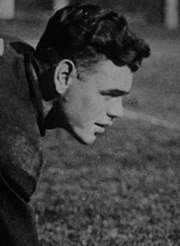Myles Lane
| Myles Lane | |||
|---|---|---|---|
| Born |
October 2, 1903 Melrose, MA, USA |
||
| Died | August 6, 1987 (aged 83) Manhattan, NY, USA |
||
| Height | 6 ft 0 in (183 cm) | ||
| Weight | 180 lb (82 kg; 12 st 12 lb) | ||
| Position | Defense | ||
| Shot | Left | ||
| Played for |
New York Rangers Boston Bruins |
||
| Playing career | 1928–1934 | ||
 |
|
| Sport(s) | Football |
|---|---|
| Biographical details | |
| Born |
October 2, 1903 Melrose, Massachusetts |
| Died | August 6, 1987 (aged 83) Manhattan, New York |
| Playing career | |
| 1925–1928 | Dartmouth |
| Position(s) | Halfback |
| Coaching career (HC unless noted) | |
| 1929 | Dartmouth (assistant) |
| 1932 | Boston University |
| 1934 | Harvard (assistant) |
| Head coaching record | |
| Overall | 2–3–2 |
|
College Football Hall of Fame Inducted in 1970 (profile) |
|
Myles Stanley J. Lane (October 2, 1903 – August 6, 1987) was a professional ice hockey player, college football player and coach, and New York Supreme Court justice. He was the last surviving member of the 1929 Stanley Cup champion Bruins.
A star player at Dartmouth College, Lane signed with the New York Rangers on October 1, 1928. He became only the third American-born player and the first American-trained player to join the National Hockey League.
In 1928, Lane was offered by the Rangers to the Bruins for Eddie Shore and $5,000. Rangers President John Hammond believed that because Lane was such a hero in his home state, the Bruins would do anything to acquire him. According to former Rangers publicity director Stan Saplin, who got the story from Lester Patrick, the telegram Bruins' president, Charles F. Adams sent back read: GET A LIFE PRESERVER - YOU ARE MYLES FROM SHORE. The Rangers later sold his contract to the Bruins for $7,500. He was with the Bruins when they won the Stanley Cup in 1929. From 1931-1934 played for the minor league Boston Cubs of the Canadian-American Hockey League.
Lane was an all-American halfback at Dartmouth College from 1925–1928, where he led the nation in scoring.
After his playing career ended, Lane turned to coaching. In 1929 he was Dartmouth's backfield coach as well as the head coach of the freshman team. In 1932 he was head football coach at Boston University. He had a 2-3-2 record in his only season with the Terriers. He was the backfield coach at Harvard in 1933 where he coached, among others, his brother Francis Lane.
He was elected to the College Football Hall of Fame in 1970.
After graduating from Boston College Law School in 1934, Lane joined the firm of O'Connor & Farber. Three years later he was appointed an assistant United States attorney for the U.S. Attorney for the Southern District of New York. He spent four years in the Navy in World War II. After the war he rejoined the US Attorney's office, becoming chief assistant. He was a member of the prosecution team in the Rosenberg trial. In September 1951 he was appointed United States Attorney, a position he held until April 1953, when he returned to private law practice.
...
Wikipedia
